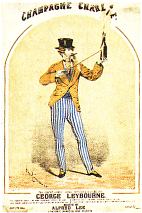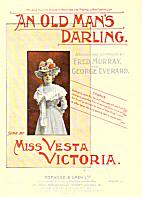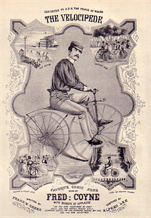 Until about 1800, popular songs were part of the world of the itinerant musician and anonymous songwriters, and sheet music was generally neither affordable or obtainable. With the rise of the "Pleasure Gardens" and the song-and-supper rooms in the 1820s, a demand for comic songs arose which was satisfied by the existing classical music publishers who sold such items as "All around my Hat" (adapted from a folk song). The style of such songs tended to be droll rather than outright funny, since the only people who had pianos to play the tunes were the middle classes who preferred more demure songs. As the 19th Century progressed, then the songs grew nearer to what would now be recognised as music hall entertainment. Publications of around 1850 still retained the folk song feel, but were becoming more humourous and direct in their approach. In particular, the songs started to switch from being folk songs with no emphasis on the author or performer to those where the singer is playing the part of a character. In such songs, the hand of a professional, who is writing for a stage performance starts to be seen. An example is Harry Clifton's song "Polly Perkins of Paddington Green"
Until about 1800, popular songs were part of the world of the itinerant musician and anonymous songwriters, and sheet music was generally neither affordable or obtainable. With the rise of the "Pleasure Gardens" and the song-and-supper rooms in the 1820s, a demand for comic songs arose which was satisfied by the existing classical music publishers who sold such items as "All around my Hat" (adapted from a folk song). The style of such songs tended to be droll rather than outright funny, since the only people who had pianos to play the tunes were the middle classes who preferred more demure songs. As the 19th Century progressed, then the songs grew nearer to what would now be recognised as music hall entertainment. Publications of around 1850 still retained the folk song feel, but were becoming more humourous and direct in their approach. In particular, the songs started to switch from being folk songs with no emphasis on the author or performer to those where the singer is playing the part of a character. In such songs, the hand of a professional, who is writing for a stage performance starts to be seen. An example is Harry Clifton's song "Polly Perkins of Paddington Green"
 It was soon found that a good writer and a composer together were not enough; it was also necessary to market the song by a proficient publisher, and to find the right performer to get the song over to the public.
It was soon found that a good writer and a composer together were not enough; it was also necessary to market the song by a proficient publisher, and to find the right performer to get the song over to the public.
 Music Publishers started producing music hall songs with colourful scenes on the cover, often depiciting the artist in appropriate pose and dress for the featured song. These tended to be expensive, and so "pirate editions" would sometimes appear. To counter this, some publisher produced lower cost versions of the sheet music with black and white covers.
Music Publishers started producing music hall songs with colourful scenes on the cover, often depiciting the artist in appropriate pose and dress for the featured song. These tended to be expensive, and so "pirate editions" would sometimes appear. To counter this, some publisher produced lower cost versions of the sheet music with black and white covers.
 The range of topics covered by the songs encompassed all aspects of life at the time, from Fred Coyne's "The Velocipede" to Billy William's "The Taximeter Car". Some were very topical such as Ernie Mayne's "Lloyd George's Beer". Others dealt with more eternal problems such as Gus Elen's song "Never introduce yer Donah to a pal" composed by Albert Ellis and Augustus Durandeau and dealing with the loss of a girlfriend to a supposed friend.
The range of topics covered by the songs encompassed all aspects of life at the time, from Fred Coyne's "The Velocipede" to Billy William's "The Taximeter Car". Some were very topical such as Ernie Mayne's "Lloyd George's Beer". Others dealt with more eternal problems such as Gus Elen's song "Never introduce yer Donah to a pal" composed by Albert Ellis and Augustus Durandeau and dealing with the loss of a girlfriend to a supposed friend.
Over the years, the music hall song had developed from its folk song beginning, through the swagger of Champagne Charlie to the homely pathos of the Cockney song. Towards the end of the music hall era, ragtime and jazz was incorporated, but this was far removed from the initial working class spirit, and really meant the demise of the music hall song.
To see a list of all the songs on Windyridge CDs:
consult our songs database